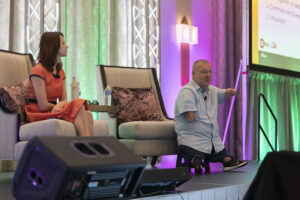Exploring Workforce Development Through More Inclusive Hiring Techniques
From rethinking job requirements to AI hiring tech, disability-inclusive hiring begins with the recruitment process
Cadmus’ industry-leading subject matter experts are regularly tapped to provide guidance, share lived experiences, and help lead our clients to build a more equitable future. As part of our Inclusion and Accessibility Services, we support our clients’ diversity, equity, inclusion, and accessibility (DEIA) culture-building efforts and help them foster inclusive workforce development best practices.
Removing Barriers from Job Descriptions
Cadmus team member Lex Huth is a disability advocate with extensive experience working on international emerging technology initiatives. She recently was a panelist on a DirectEmployers Association Masterclass Employment Law Roundtable on Thinking Holistically to Make Job Descriptions More Gender-Neutral and Disability Friendly. She joined John Robinson, President and CEO of Our Ability, John C. Fox, Esq. of Fox, Wang & Morgan P.C., and Candee Chambers, Executive Director of DirectEmployers Association, for this 60-minute conversation to help professionals understand the barriers that job descriptions may create for disabled job seekers.
Huth stressed the need for more critical reviews of what skills a job actually requires, explaining that non-critical requirements such as a driver’s license for a job that does not involve driving can unnecessarily filter out qualified candidates, both with and without disabilities. Reflecting on the event, Huth shared, “To truly be inclusive, we need to remove arbitrary barriers. That’s why I am thankful that I had the chance to participate in the Masterclass. I want to remind people that inclusion starts much earlier in the employment process than they might think.”
Leveraging AI Tech for Inclusive Hiring Practices
Through our efforts working with the Partnership on Employment & Accessible Technology (PEAT), funded by the U.S. Department of Labor’s Office of Disability Employment Policy, Huth also presented on inclusive hiring techniques at DirectEmployers Annual Meeting & Conference (DEAMcon24) on behalf of PEAT.

Businesses of all sizes are impacted by the potential benefits and possible harms of artificial intelligence (AI) in their recruiting and hiring technologies. While some may consider the human resources tech space “too technical” or beyond their current capabilities, this mentality can cause them to lose job candidates with the skills they need to succeed. In some cases, small and midsized (SMBs) may already use AI-enabled hiring technologies without knowing it. In this session, Robinson and Huth, team up to show how people with disabilities are leading the way to more inclusive AI in hiring technologies – and how SMBs can maximize the benefits they get from these AI-powered tools.
Key learning objectives for the session:
- How AI can be used for inclusion in SMB-specific hiring scenarios.
- How to remove ableist language and requirements from job descriptions.
- Why people with disabilities need to be involved in the procurement and use of AI-enabled hiring technologies.
- Common ways that AI can be biased, and specific ways small HR teams can mitigate the risks.

A full summary of the session and additional AI-related resources can be found in the DEAMcon24 recap.
Today’s leaders in government and industry are working together to build a future rooted in equity and many are integrating AI to meet the demand for better service, greater efficiency, and increased engagement. Talk to an expert and learn more about how Cadmus collaborates with our clients to create more DEIA programs, services, and partnerships that support all people and the communities where they live.
Recent News
Warning: include(/nas/content/live/cadmus1dev/wp-content/themes/CadmusBuild/components/PostsSingle/components/socialshare/index.php): Failed to open stream: No such file or directory in /nas/content/live/cadmus1dev/wp-content/themes/CadmusBuild/components/PostsSingle/index.php on line 54
Warning: include(): Failed opening '/nas/content/live/cadmus1dev/wp-content/themes/CadmusBuild/components/PostsSingle/components/socialshare/index.php' for inclusion (include_path='.:/usr/share/pear/php:/usr/share/php') in /nas/content/live/cadmus1dev/wp-content/themes/CadmusBuild/components/PostsSingle/index.php on line 54